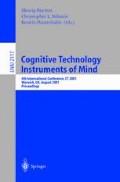Abstract
Many interactive systems in everyday use carry out roles that are also performed - or have previously been performed - by human beings. Our expectations of how such systems will and, more importantly, should, behave is tempered both by our experience of how humans normally perform in those roles and by our experience and beliefs about what it is possible and reasonable for machines to do. So, an important factor underpinning the acceptability of such systems is the plausibility with which the role they are performing is viewed by their users.
We identify three kinds of potential plausibility issue, depending on whether (i) the system is seen by its users to be a machine acting in its own right, or (ii) the machine is seen to be a proxy, either acting on behalf of a human or providing a channel of communication to a human, or (iii) the status of the machine is unclear between the first two cases.
Access this chapter
Tax calculation will be finalised at checkout
Purchases are for personal use only
Preview
Unable to display preview. Download preview PDF.
References
T.-W. Chan. Learning companion systems, social learning systems, and the global learning club. Journal of Artificial Intelligence in Education, 7(2):125–159, 1996.
N. Dahlback, A. Jonsson, and L. Ahrenberg. Wizard of Oz studies-why and how. In M. T. Maybury and W. Wahlster, editors, Readings in Intelligent User Interfaces. Morgan Kaufmann, San Francisco, 1998.
T. del Soldato. Motivation in tutoring systems. Technical Report CSRP 303, School of Cognitive and Computing Sciences, University of Sussex, 1994.
T. del Soldato and B. du Boulay. Implementation of motivational tactics in tutoring systems. Journal of Artificial Intelligence in Education, 6(4):337–378, 1996.
B. du Boulay, R. Luckin, and T. del Soldato. The plausibility problem: Human teaching tactics in the ‘hands’ of a machine. In S. P. Lajoie and M. Vivet, editors, Artificial Intelligence in Education: Proceedings of the International Conference of the AI-ED Society on Artificial Intelligence and Education, Le Mans France, pages 225–232. IOS Press, 1999.
B. Fogg and H. Tseng. The elements of computer credibility. In Proceedings of CHI’99, pages 80–87, Pittsburgh, 1999.
L. Hammerton and R. Luckin. Children and the internet: a study of 9–11 year olds. Paper to be presented in a workshop at AIED 2001, San Antonio, Texas, 2001.
L. Hammerton and R. Luckin. How to help? investigating children’s opinions on help. Poster to be presented at AIED 2001, San Antonio, Texas, 2001.
W. L. Johnson, J. W. Rickel, and J. C. Lester. Animated pedagogical agents: Face-to-face interaction in interactive learning environments. International Journal of Artificial Intelligence in Education, 11(1):47–78, 2000.
J. M. Keller. Motivational design of instruction. In C. M. Reigeluth, editor, Instructional-design Theories and Models: An Overview of their Current Status. Lawrence Erlbaum, 1983.
M. R. Lepper. Motivational considerations in the study of instruction. Cognition and Instruction, 5(4):289–309, 1988.
M. R. Lepper and R. Chabay. Socializing the intelligent tutor: Bringing empathy to computer tutors. In H. Mandl and A. Lesgold, editors, Learning Issues for Intelligent Tutoring Systems, pages 242–257. Springer-Verlag, New York, 1988.
M. R. Lepper, M. Woolverton, D. L. Mumme, and J.-L. Gurtner. Motivational techniques of expert human tutors: Lessons for the design of computer-based tutors. In S. P. Lajoie and S. J. Derry, editors, Computers as Cognitive Tools, pages 75–105. Lawrence Erlbaum, Hillsdale, New Jersey, 1993.
A. Lesgold, S. Lajoie, M. Bunzo, and G. Eggan. Sherlock: A coached practice environment for an electronics troubleshooting job. In J. H. Larkin and R. W. Chabay, editors, Computer-Assisted Instruction and Intelligent Tutoring Systems, pages 289–317. Lawrence Erlbaum Associates, Hillsdale, New Jersey, 1992.
R. Luckin. ‘ECOLAB’: Explorations in the Zone of Proximal Development. Technical Report CSRP 386, School of Cognitive and Computing Sciences, University of Sussex, 1998.
R. Luckin and B. du Boulay. Ecolab: The development and evaluation of a vygot-skian design framework. International Journal of Artificial Intelligence in Education, 10(2):198–220, 1999.
R. Luckin and J. Rimmer. Children and the internet: a study of 9-11 year olds perceptions of networked technologies. Technical report, School of Cognitive and Computing Sciences, University of Sussex. In preparation.
S. Puntambekar and B. du Boulay. Design and development of MIST-a system to help students develop metacognition. Journal of Educational Computing Research, 16(1):1–35, 1997.
J. A. Ramirez Uresti. Should I teach my computer peer? some issues in teaching a learning companion. In G. Gauthier, C. Frasson, and K. VanLehn, editors, Intelligent Tutoring Systems: 5th International Conference, ITS 2000, Montreal, number 1839 in Lecture Notes in Computer Science, pages 103–112. Springer, 2000.
L. Sheeran, M. Sasse, J. Rimmer, and I. Wakeman. Back to basics: Is a better understanding of the internet a precursor for effective use of the web? In NordiCHI, Stockholm, 2000.
D. J. Wood and D. J. Middleton. A study of assisted problem solving. British Journal of Psychology, 66:181–191, 1975.
Author information
Authors and Affiliations
Editor information
Editors and Affiliations
Rights and permissions
Copyright information
© 2001 Springer-Verlag Berlin Heidelberg
About this paper
Cite this paper
du Boulay, B., Luckin, R. (2001). The Plausibility Problem: An Initial Analysis. In: Beynon, M., Nehaniv, C.L., Dautenhahn, K. (eds) Cognitive Technology: Instruments of Mind. CT 2001. Lecture Notes in Computer Science(), vol 2117. Springer, Berlin, Heidelberg. https://doi.org/10.1007/3-540-44617-6_28
Download citation
DOI: https://doi.org/10.1007/3-540-44617-6_28
Published:
Publisher Name: Springer, Berlin, Heidelberg
Print ISBN: 978-3-540-42406-2
Online ISBN: 978-3-540-44617-0
eBook Packages: Springer Book Archive

